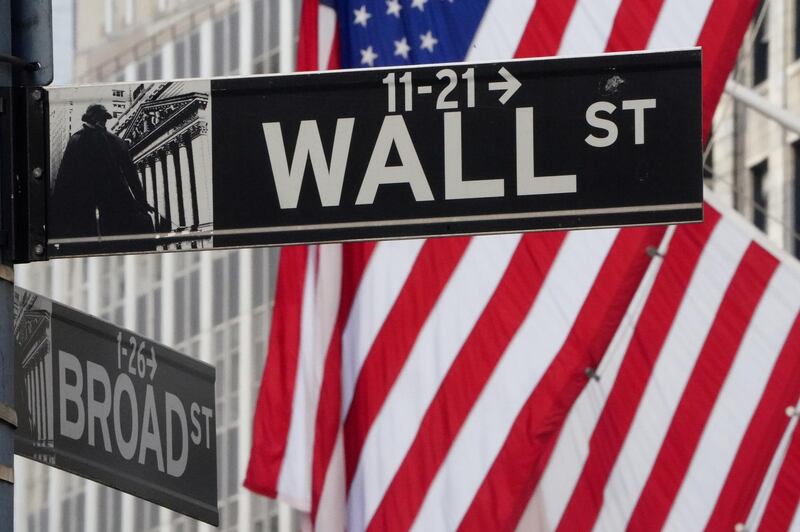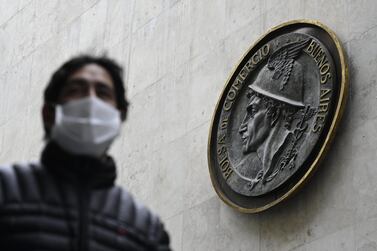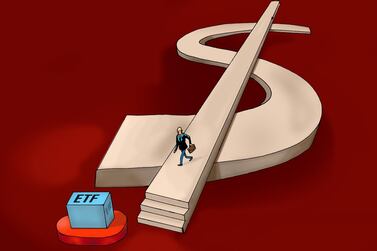Josh Black was looking for the next lucrative deal after scoring a 500 per cent profit in a few weeks by investing in US-based electric truck maker Nikola following the announcement of its merger with a blank-cheque acquisition company.
He then invested $23,000 (Dh84,467) in Spartan Energy Acquisition after the special purpose acquisition company (Spac), backed by buyout firm Apollo Global Management, clinched a $2.9 billion deal to merge with electric car maker Fisker.
This time Mr Black wasn't so lucky.
The mechanic from Cherry, Minnesota, in the US, is down more than 10 per cent on his investment after Spartan's stock gave up much of its initial gains following the announcement of the Fisker deal last month.
It's a different story for the big mutual funds, including BlackRock, AllianceBernstein and Federated Hermes Kaufmann, which were invited to finance the Fisker deal – and buy shares in Spartan before it was announced.
Even after the decline in Spartan's stock, they're still up about 25 per cent.
To be sure, retail investors who buy into Spacs before they clinch deals pay the same price as big Wall Street firms. But they have to do this without knowing what the acquisition target will be, taking a leap of faith on a Spac's management team.
The biggest Spac investors are treated differently.
They are told beforehand what the acquisition target is under confidentiality agreements, in exchange for providing financing for the deal in the form of a private investment in public equity, or Pipe, transaction.
While preferential treatment of cornerstone investors is allowed under securities regulations, Wall Street's embrace of what used to be a backwater of the stock market underscores how it is now using its heft to tip the scales in its favour.
Federated Hermes portfolio manager Stephen DeNichilo says retail investors buying shares in Spacs "need to take extra care and do extra due diligence".
He said his firm was given advance information on Spac deals, such as Fisker, because it put in a substantial amount of money as an accredited investor.
"We are taking a greater risk because we are investing earlier on. It takes three months for these transactions to close. A lot can happen in those three months," Mr DeNichilo says.
Spartan, Fisker, and AllianceBernstein did not respond to requests for comment. BlackRock declined to comment.
For retail investor Mr Black, though, it was the announcement that well-known Wall Street firms were backing the Fisker deal to the tune of $500 million that emboldened him to buy Spartan.
"Big institutional investors buy huge amounts because they see a good opportunity. They are smart people behind those walls," he says.
Mr Black says he is now holding on to the stock, hoping it will go up by the time Spartan completes the merger.
As a record number of companies pursue mergers with Spacs as a way of going public that bypasses the traditional initial public offering, Wall Street has obliged.
High-profile financiers such as Bill Ackman and Chamath Palihapitiya have raised billions of dollars for these shell firms through IPOs, with the aim of then combining with real companies in the next couple of years.
Mom-and-pop investors have followed suit, helping to fuel a frenzy for Spac stocks in the wake of their deal announcements.
While some deals, such as those for Nikola, space tourism company Virgin Galactic Holdings and fantasy sports company DraftKings, have proved lucrative, others have left retail investors in the red.
The average Spac underperformed the S&P 500 and Russell 2000 indexes three, six and 12 months after their merger completion, according to Goldman Sachs Group analysts who analysed 56 Spac deals since January 2018.
That is despite the average Spac outperforming the indexes one month and three months following a deal announcement.
"There is some pump-and-dump trading going on with these Spacs," says Rosaria Pellegrino, a bed-and-breakfast owner in Naples, Italy, who is down 30 per cent on her investment in Spacs that did deals with electric truck maker Hyliion and 3D mapping company Velodyne Lidar.
Like Mr Black, she's keeping the stocks for now in the hope of recouping her losses.
As big Wall Street firms pile into Spacs, more and more Pipe deals are being struck with funds providing the bulk of the financing for specific targets. So far this year, Pipe deals with Spacs have totalled $3.1bn, already more than for the whole of 2019, according to Spac Research.
"The fact that investors in size are willing to commit to the transaction and forward underwrite market risk for months serves as a guidepost to the rest of the market and usually results in positive price momentum once the transaction is announced," says Niron Stabinsky, who heads Credit Suisse Group's Spac practice.
Pipe deals have helped push Spac acquisitions in 2020 to a record $27.4bn, including debt, with a further $35.2bn worth of deals announced and pending completion. Spac deals last year came to $24.8bn.
"The greater availability of institutional Pipe capital often enables these deals to get done," says Joel Rubinstein, a partner at law firm White & Case, who leads the firm's Spac practice.
Spacs have raised $22.5bn this year to spend on deals, exceeding the record $13.6bn raised in 2019. There are 104 Spacs, which have raised together $32.4bn, currently chasing deals, according to Spac Research.
"Since Covid-19 came into the US and affected the economy, merging with a Spac allows a company to explain their story a little bit differently to the traditional IPO process," says Douglas Adams, global co-head of equity capital markets at Citigroup.
In many cases, there are no restrictions placed on Wall Street firms on when they can cash out after a Pipe deal with a Spac. Armed with knowledge of what a Spac's acquisition target will be, the big institutional investors also get a chance to grab a big slice of these deals for themselves.
"On a hot IPO, an institutional investor may only get a 2 per cent to 4 per cent allocation of a deal. But in a Spac deal, they get potentially 10 per cent to 20 per cent of the Pipe," says Jeff Mortara, head of US equity capital markets origination at UBS Group.








